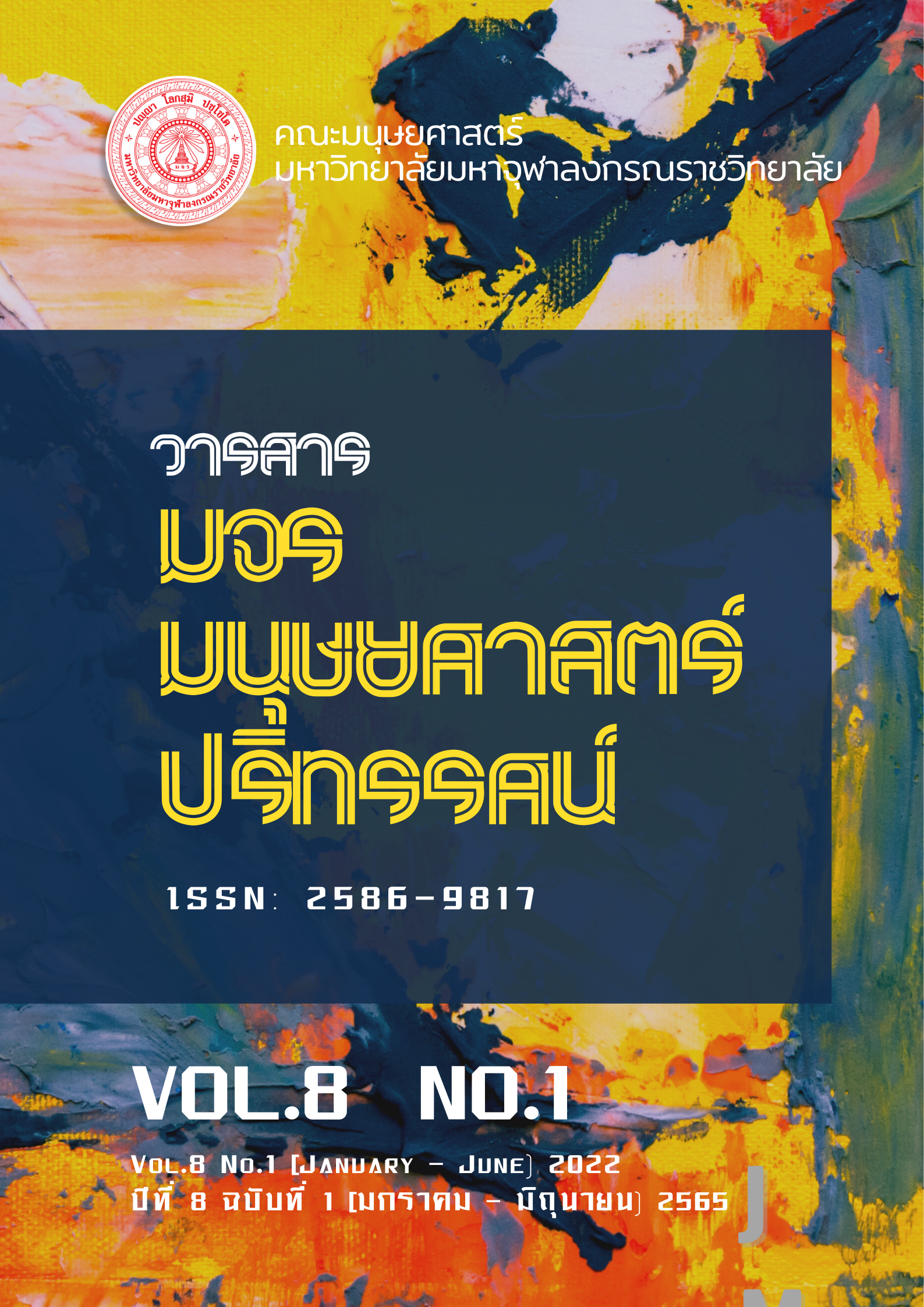พลังความคิด เนรมิตสุขภาพที่ดี
คำสำคัญ:
สุขภาพใจ, สุขภาพกาย, พลังความคิดบทคัดย่อ
พลังความคิด เกิดจากการฝึกคิดด้วยปัญญาเพื่อให้มีความคิดถูกต้อง ดีงาม ด้วยหลักการคิดตามแนวพุทธ 2 ประการ ได้แก่ 1. วิธีคิดแบบอยู่กับปัจจุบัน 2. วิธีคิดให้เกิดผลดีหรือเกิดประโยชน์ทั้งต่อตนเองและส่วนรวม วิธีการเพื่อให้ความคิดมีพลังทำได้ด้วยการฝึกสมาธิ เสริมด้วยหลักจิตวิทยาการคิดเชิงบวก 5 องค์ประกอบ ได้แก่ 1) สภาวะของอารมณ์ที่ดี 2) ความรู้สึกร่วมเป็นส่วนหนึ่ง 3) การมีความสัมพันธ์ที่ดี 4) การรู้สึกถึงชีวิตที่มีความหมาย และ 5) การบรรลุถึงเป้าหมาย พลังความคิด ที่เกิดจากสมาธิและความคิดเชิงบวก สามารถส่งเสริมให้มีสุขภาพกายที่แข็งแรง พัฒนาจิตใจให้เจริญงอกงาม มีคุณธรรม จริยธรรม นำพาบุคคลไปสู่การดำรงชีวิตที่มีดีงาม และมีความสุขอย่างยั่งยืนได้
เอกสารอ้างอิง
กรมสุขภาพจิต. (2563). องค์ความรู้การดูแลสุขภาพใจในสถานการณ์การระบาด โควิด-19 “ใจพร้อม ไม่ยอมป่วย”. สืบค้น 10 กันยายน 2564, จาก https://www.dmh.go.th/covid19/pnews/files/องค์ความรู้การดูแลสุขภาพใจ.pdf
การส่งเสริมสุขภาพจิต. (2560). แนวคิด หลักฐาน และแนวทางปฏิบัติ. สืบค้น 15 กันยายน 2564, จาก https://apps.who.int/iris/bitstream/handle/10665/43286/9241562943-tha.pdf
จิรกิตต์ภรณ พิริยสุวัฒน์. (2562), จิตวิทยาในพระไตรปิฎก (พิมพ์ครั้งที่ 3). เลย : โรงพิมพ์บ้านนาอ้อ.
นริศ เจนวิริยะ. (2017). ใจ – กาย ความสัมพันธ์ที่พิสูจน์ได้, Health Today, No.178 November 2017. สืบค้น 15 กันยายน 2564, จาก https://www.healthtodaythailand.in.th/ใจ-กาย-ความสัมพันธ์ที่/
ชมรมลานความคิด. (2552). พลังความคิด. สืบค้น 18 ตุลาคม 2564, จาก http://oknation.nationtv.tv/blog/Duplex/2009/07/21/entry-2
บรรพต แสนสุวรรณ. (2561). การพัฒนากิจกรรมเสริมสร้างทักษะชีวิตตามแนวคิดโยนิโสมนสิการสำหรับนักเรียนชั้นมัธยมศึกษาในโรงเรียนขยายโอกาสทางการศึกษา (โครงการวิจัยและพัฒนานวัตกรรมแลกเป้า). สำนักงานเขตพื้นที่การศึกษาประถมศึกษาสกลนคร เขต 1.
ศักดิ์ชัย ภู่เจริญ. (2554). สมองกับการคิด. สืบค้น 17 กันยายน 2564, จาก http://www.kruinter.com/show.php?id_quiz=767&p=1
สมเด็จพระพุทธโฆษาจารย์ (ป.อ.ปยุตฺโต). (2563). พุทธธรรม (ฉบับปรับขยาย) (พิมพ์ครั้งที่ 54). กรุงเทพฯ : สํานักพิมพ์ผลิธัมม์.
สำนักงานกองทุนสนับสนุนการสร้างเสริมสุขภาพ. (2020). คู่มือสร้างภูมิคุ้มกันใจ. สืบค้น 13 กันยายน 2564, จาก https://www.happinessisthailand.com/2020/07/14/ howto-1-general-public/
สำนักงานพัฒนาการเศรษฐกิจและสังคมแห่งชาติ. (2564). รายงานภาวะสังคมไทยไตรมาส 2/2564. สืบค้น 13 กันยายน 2564, จาก https://www.nesdc.go.th/ewt _dl_link.php?nid=5491&filename=socialoutlook
สุวัฒน์ ธนกรนุวัฒน์, สมโภชน์ เอี่ยมสุภาษิต และ สิริวัฒน์ ศรีเครือดง. (2562). การเจริญสติในวิถีพุทธจิตวิทยา. วารสาร มจร มนุษยศาสตร์ปริทรรศน์, 5(2), 185-197.
Bruce H. Lipton. (2015). The Biology of Belief: Unleashing the Power of Consciousness, Matter & Miracles. Hay House UK Ltd, London, United Kingdom.
Daniel J. DeNoon. (2020). Health Depends on Mental Health. Retrieved September, 17 2020, from https://www.webmd.com/mental- health/news/20070904/health-depends-on-mental-health
Joe Dispenza. (2019). คุณคือพลาซิโบ ทำความคิดให้ออกฤทธิ์กับสุขภาพ [You Are the Placebo: Making Your Mind Matter] (ติณณ์ อินทพิเชฏฐ์, ผู้แปล). Bangkok: Good health printing and packaging group.
Nathaniel Branden. (1987). พลังแห่งการนับถือตัวเอง [How to raise your Self-Esteem: The proven action - oriented approach to greater Self-Respect and Self-Confidence] (สาริศา มีสุขศรี, ผู้แปล). Bangkok: Oh My God publishing.
Remez Sasson. (2020). Mind Power–The Power of Thoughts, Success Consciousness. Retrieved September, 17 2020, from https://www.success consciousness.com/blog/concentration-mind-power/mind-power/
See Doctor Now. (2017). สุขภาพใจเป็นอย่างไร สุขภาพกายเป็นอย่างนั้น. สืบค้น 17 กันยายน 2564, จาก https://www.seedoctornow.com/health-mentalhealth/

ดาวน์โหลด
เผยแพร่แล้ว
รูปแบบการอ้างอิง
ฉบับ
ประเภทบทความ
หมวดหมู่
สัญญาอนุญาต
ลิขสิทธิ์ (c) 2022 วารสาร มจร มนุษยศาสตร์ปริทรรศน์

อนุญาตภายใต้เงื่อนไข Creative Commons Attribution-NonCommercial-NoDerivatives 4.0 International License.





